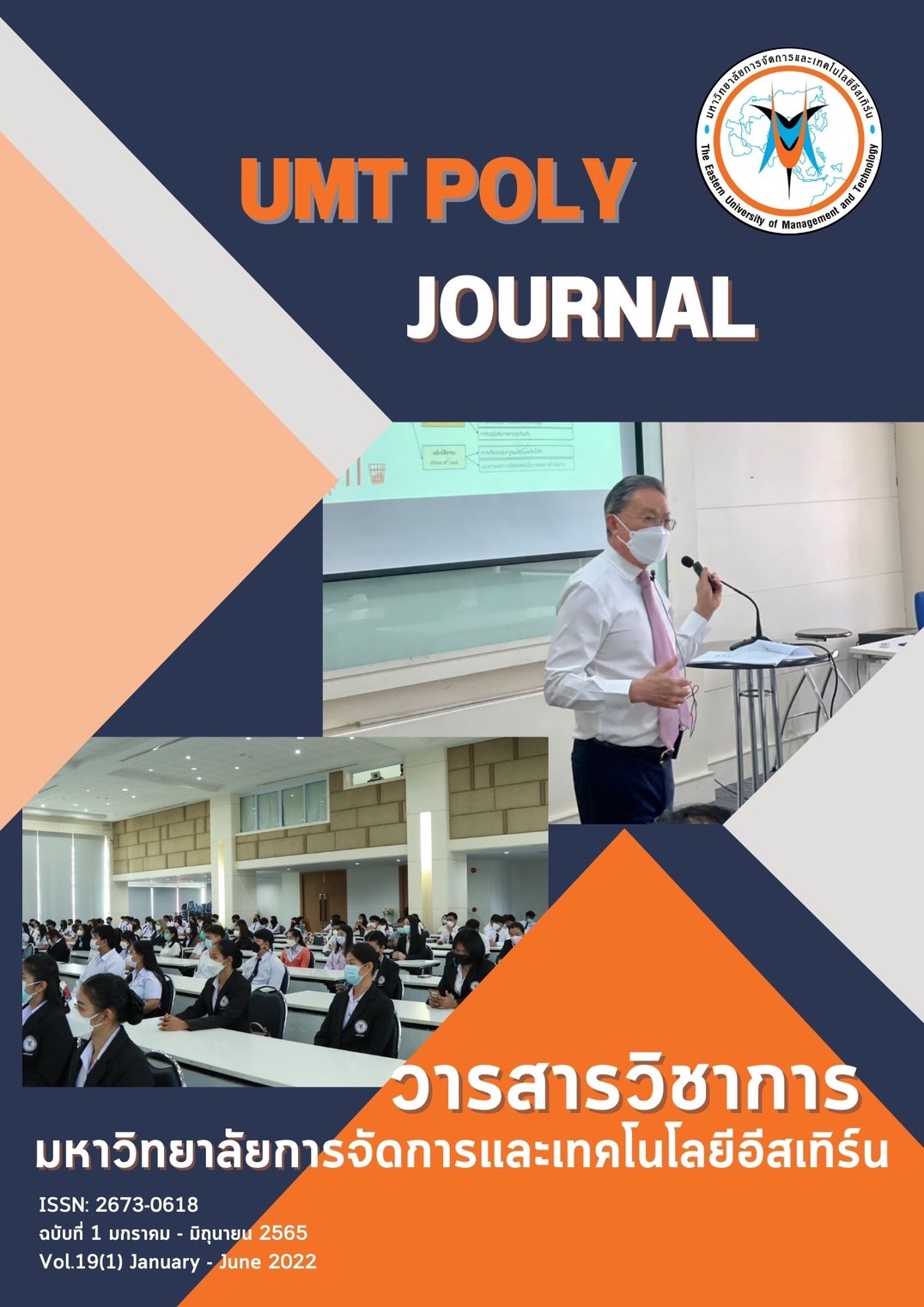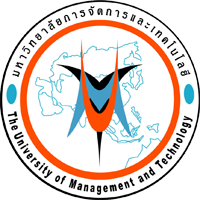ความสัมพันธ์ระหว่างผู้นำทางการศึกษากับกระบวนการนิเทศและ การประกันคุณภาพการศึกษาของโรงเรียนสังกัดสำนักงานศึกษาธิการภาค 14
คำสำคัญ:
ผู้นำการศึกษา, กระบวนการนิเทศ, การประกันคุณภาพการศึกษาบทคัดย่อ
บทคัดย่อ
งานวิจัยนี้มีวัตถุประสงค์เพื่อศึกษาความสัมพันธ์และความแตกต่างของค่าเฉลี่ย รวมถึงการวิเคราะห์อิทธิพลขององค์ประกอบผู้นำการศึกษาและกระบวนการนิเทศที่มีผลต่อการประกันคุณภาพการศึกษาพร้อมข้อเสนอแนะแนวทางพัฒนา โดยผู้วิจัยใช้แบบสอบถามไปรวบรวมความเห็นของผู้บริหารและครูในสังกัดสำนักงานศึกษาธิการภาค 14 จำนวน 400 คนมาวิเคราะห์ผลด้วยสถิติวิเคราะห์ค่าเฉลี่ย วิเคราะห์ความสัมพันธ์ วิเคราะห์ความแปรปรวนหลายตัวแปร และวิเคราะห์ถดถอยพหุคูณ
ผลวิจัยพบว่า 1) ค่าเฉลี่ยของผู้นำการศึกษา กระบวนการนิเทศ และการประกันคุณภาพการศึกษาอยู่ในระดับมากทั้งภาพรวมและตัวแปรองค์ประกอบ 2) แนวคิดทั้งสามมีความสัมพันธ์กันอย่างมีนัยสำคัญทางสถิติที่ระดับ .01 3) องค์ประกอบอิทธิพลและแนวทางพัฒนาผู้นำการศึกษากับกระบวนการนิเทศให้มีผลต่อการประกันคุณภาพการศึกษาประกอบด้วย 1) ความรู้และความรอบรู้ทางดิจิทัล 2) ความร่วมมือในการทำงาน 3) การแสดงแนวทางที่ชัดเจน 4) การประเมินผล 5) การวางแผน 6) การควบคุม และ 7) การนำเข้าสู่การปฏิบัติ โดยที่องค์ประกอบทั้งสองกลุ่มมีสัมประสิทธิ์อิทธิพลต่อการพยากรณ์ที่ค่า R2 = .23 และ .48 อย่างมีนัยสำคัญทางสถิติที่ระดับ .05
Downloads
เอกสารอ้างอิง
เอกสารอ้างอิง (References)
กรวีร์ เกษบรรจง. (2556). ปัจจัยการบริหารที่ส่งผลต่อการนิเทศภายในโรงเรียนของผู้บริหาร
สถานศึกษา สังกัดสำนักงานเขตพื้นที่การศึกษาประถมศึกษาประจวบบคีรีขันธ์ เขต 1. วารสารวิจัยมหาวิทยาลัยเทคโนโลยีราชมงคลศรีวิชัย, 5(2), 56-68
ณิกร กรีโส วาโร เพ็งสวัสดิ์ และอนันต์ ปานศุภวัชร. (2555). ความสัมพันธ์ระหว่างภาวะผู้นำทางการ
นิเทศของผู้บริหารโรงเรียนกับพฤติกรรมการสอนของครูในโรงเรียน สังกัดสำนักงานเขตพื้นที่การศึกษานครพนม เขต 2. วารสารมหาวิทยาลัยนครพนม, 2(3), 78-83.
รุ่งนภา นุตราวงศ์. (2552). หลักสูตรอิงมาตรฐานการพัฒนาสู่คุณภาพ.วารสารวิชาการ, 12 (4), 60.
สำนักทดสอบทางการศึกษา (2554). แนวทางการพัฒนาระบบประกันคุณภาพภายในของ สถานศึกษาตามกฎกระทรวงว่าด้วยระบบ หลักเกณฑ์ และวิธีการประกันคุณภาพ - การศึกษา พ.ศ.2553. กรุงเทพฯ : โรงพิมพ์สหกรณ์การเกษตรแห่งประเทศไทย
สำนักงานคณะกรรมการการศึกษาขั้นพื้นฐาน (2554). แนวทางการจัดการเรียนรู้ในโรงเรียนมาตรฐานสากล. ผู้พิมพ์
Akpa, G.O. & Gyang, T. S. (2018). Leadership in Education for Sustainable Development in Nigeria.
In E. A. Nelson, & J. E. Ebele (Eds.), Education for Sustainable Development: The teacher challenge in providing quality education in Nigeria by 2030 (pp. 92-105). Abraka, Nigeria: Faculty of Education, Delta State University.
Amtu, O., Souisa, S. L., Joseph, L. S., & Lumamuly, P. C. (2021). Contribution of leadership,
organizational commitment and organizational culture to improve the quality of higher education. International Journal of Innovation-IJI, São Paulo, 9 (1), 131-157. https://doi.org/10.5585/iji.v9i1.18582.
Anderson, D.; Johnson, R.; Milligan, B. (2000). Quality Assurance and Accreditation in Australian
Higher Education: An Assessment of Australian and International Practice, 1st ed.; AusInfo: Canberra, Australia, 2000
Arokiasamy, A. R., Abdullah, A. G., & Ismail, A. (2014). Correlation between cultural
perceptions, leadership style and ICT usage by school principals in Malaysia. TOJET: The Turkish Online Journal of Educational Technology, 13(3), 27-40.
Bilyalova A. , Salimova D., & Zelenina T. (2020). Digital Transformation in Education.
In: T. Antipova (Ed.), ICIS: International Conference on Integrated Science. Integrated Science in Digital Age (pp. 265-276). Cham, Switzerland: Springer.
https://doi.org/10.1007/978-3-030-22493-6_24
Brown, C., Czerniewicz, L., Huang, C.-W. & Mayisela, T. (2016). Curriculum for digital education
leadership: A concept paper. Commonwealth of Learning (COL). Vancover:
Commonwealth of Learning and University of Cape Town.
Buzzi, B.M. (2013). Leadership and Performance beyond expectations. New York:
The Free Press.
Fernandez, A. A. & Shaw, G. P. (2020). Academic leadership in a time of crisis: The
coronavirus and COVID-19. Journal of Leadership Studies, 14 (1), 39-45.
Fleming, D.S. & Fleming, B.A. (2001). School Strategies and Options. (Online).
Available: http:// www.Tiac.net/users/dfleming/index.html.
Francisco, C. D., & Nuqui, A. V. (2020). Emergence of a situational leadership during
COVID-19. International Journal of Academic Multidisciplinary Research (IJAMR), 4(10),
-19.
Gray, C. (2018). What are the qualities of a digital leader?. Retrieved from
https://www.manpowergroup.co.uk/the-word-on work / digital-leader-qualities
Gurr, D., & Drysdale, L. (2020). Leadership for challenging times. International Studies
in Educational Administration, 48 (1), 24-31.
Guntoro, G. (2020). Supervisi Pengawas dan Kepemimpinan Kepala Sekolah sebagai
Stimulus dalam Meningkatkan Kinerja Guru. Jurnal Ilmiah Iqra, 14(1).
https://doi.org/10.30984/jii.v14i1.1100
Harris, A. & Jones, M. (2020). COVID 19-school leadership in disruptive times. School Leadership &
Management, 40(4), 243-247.
Kis, V. (2005). Quality Assurance in Tertiary Education: Current Practices in OECD
Countries and a Literature Review on Potential Effects. OECD (2005), Thematic Review of Tertiary Education. Available online: http://www.oecd.org/education/skills-beyond-school/38006910.pdf (accessed on 25 September 2020)
Kos, Z. (2021). Shifting Regulative Ideas of Education Policy and Practice: The Case of
Quality Assurance in Education in Slovenia. C.E.P.S Journal, 11(2), 145-164.
Leithwood, K., Harries, A., & Hopkins, D. (2008). Seven strong claims about successful
school leadership. School Leadership and Management, 28(1), 27-42.
Lenn, M. P. (2004). Strengthening World Bank support for quality assurance and
accreditation in higher education in East Asia and the Pacific (Working Paper no. 2004-6). Washington, DC: World Bank.
Loriggio, P. (2020). Some Canadian Universities Say Fall Classes Will Be Offered
Primarily Online. CTV News (retrieved from https://www.ctvnews.ca/health/coronavirus/some-canadian-universities-say-fall classes-will-be-offered-primarily-online-1.4936005).
Martin, M., & Parikh, S. (2017). Quality management in higher education:
Developments and drivers. International Institute for Educational Planning, UNESCO.
Marshall, J., Roache, D. & Moody-Marshall, R. (2020). Crisis Leadership: A Critical
Examination of Educational Leadership in Higher Education in the Midst of the COVID-19 Pandemic. ISEA, 48(3), 30-37.
Ossiannilsson, E., Williams, K., Camilleri, A., & Brown, M. (2015). Quality models
around the globe: State of the art. Oslo: ICDE.
Ossiannilsson, E. (2017a). Promoting active and meaningful learning for digital
learners. In J. Keengwe (Ed.), mobile Handbook of research technology, constructivism meaningful learning, (pp. 294-315).
Ossiannilsson. E. (2018). Leadership: In a time when learners take ownership of their
own learning. In K. Buyuk, S. Kocdar, & A. Bozkurt (Eds.), Administrative leadership in open and distance learning programs (pp. 1-33). Hershey: IGI Global.
Promsri, C. (2019). Developing model of digital leadership for a successful digital
transformation. gph- International Journal, pp1-8.
Sheninger, E., & Murray, T. C. (2017). Ensure. Learning Strategies: 8 keys to designing
tomorrow's schools, today. [Web log message]. Retrieved from
https://www.edsurge.com/news/2017 05-31-8-keys-to-designing-tomorrow-s schools-today
Siregar, T., Milfayetty, S., Darwin. & Siregar, R.S. (2021). Model for Improving the
Commitment to Implementation of the Educational Quality Assurance Policy. International Journal of Sciences: Basic and Applied Research (IJSBAR), 55(2). 92-102.
Terrell, S.R. (2012). Mixed-method research methodologies. The Qualitative Report, 17(1), 254-280.
Ucar, E. M. , & Levent, F. (2017). An accreditation experience in higher education: the
case of a foreign languages preparatory school of a foundation university in Turkey. The Journal of International Social Research, 10 (52), 846-857.
doi: http://dx.doi.org/10.17719/jisr.2017.1941
UNESCO. (2015a). Sustainable development goal 4 and its targets. Retrieved from
https://en.unesco.org/education2030 sdg4 /targets.
UNESCO. (2015b). The Incheon declaration. Education 2030. Towards inclusive and
equitable quality lifelong learning for all. Retrieved from
http://unesdoc.unesco.org/images/0023/ pula 002338/233813m.pdf
Vogel, L. R. (2012). Leading with hearts and minds: Ethical orientations of educational
leadership doctoral students. Values and Ethics in Educational Administration, 10(1), 1-12.
Yukl, G. (2010). Leadership in organizations 7th ed. Upper Saddle River, NJ: Prentice Hall.
Zgaga, P. (1997). Izobraževanjeučiteljev kot del sistema visokega šolstva (Teacher
education as part of higher education]. In Izobraževanjeučiteljev ob vstopu v tretje tisočletje (pp. 45-58). Pedagoška fakulteta in MSS.
ดาวน์โหลด
เผยแพร่แล้ว
ฉบับ
ประเภทบทความ
สัญญาอนุญาต
ประกาศลิขสิทธิ์
เนื้อหาและข้อมูลในบทความที่ลงตีพิมพ์ในวารสารวิชาการมหาวิทยาลัยการจัดการและเทคโนโลยีอีสเทิร์น ถือเป็นข้อคิดเห็นและความรับผิดชอบของผู้เขียนบทความโดยตรง ซึ่งกองบรรณาธิการวารสารไม่จำเป็นต้องเห็นด้วยหรือร่วมรับผิดชอบใด ๆ
บทความ ข้อมูล เนื้อหาหรือรูปภาพ ฯลฯ ที่ได้รับการตีพิมพ์ในวารสารวิชาการมหาวิทยาลัยการจัดการและเทคโนโลยีอีสเทิร์น ถือเป็นลิขสิทธิ์ของวารสารวิชาการมหาวิทยาลัยการจัดการและเทคโนโลยีอีสเทิร์น หากบุคคลหรือหน่วยงานใดต้องการนำข้อมูลทั้งหมดหรือบางส่วนไปเผยแพร่ต่อหรือเพื่อกระทำการใด ๆ จะต้องได้รับอนุญาตเป็นลายลักษณ์อักษรจากวารสารวิชาการมหาวิทยาลัยการจัดการและเทคโนโลยีอีสเทิร์นก่อนเท่านั้น




